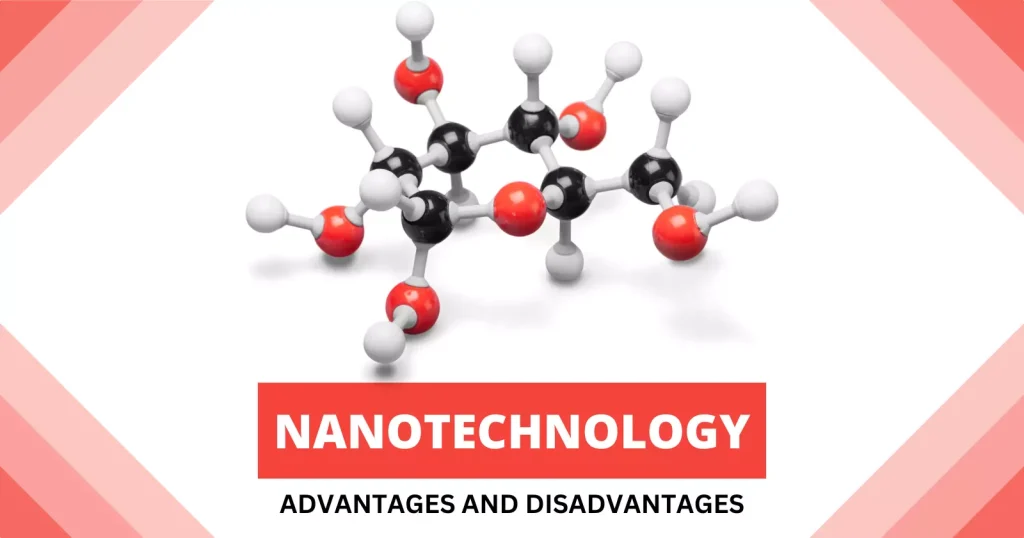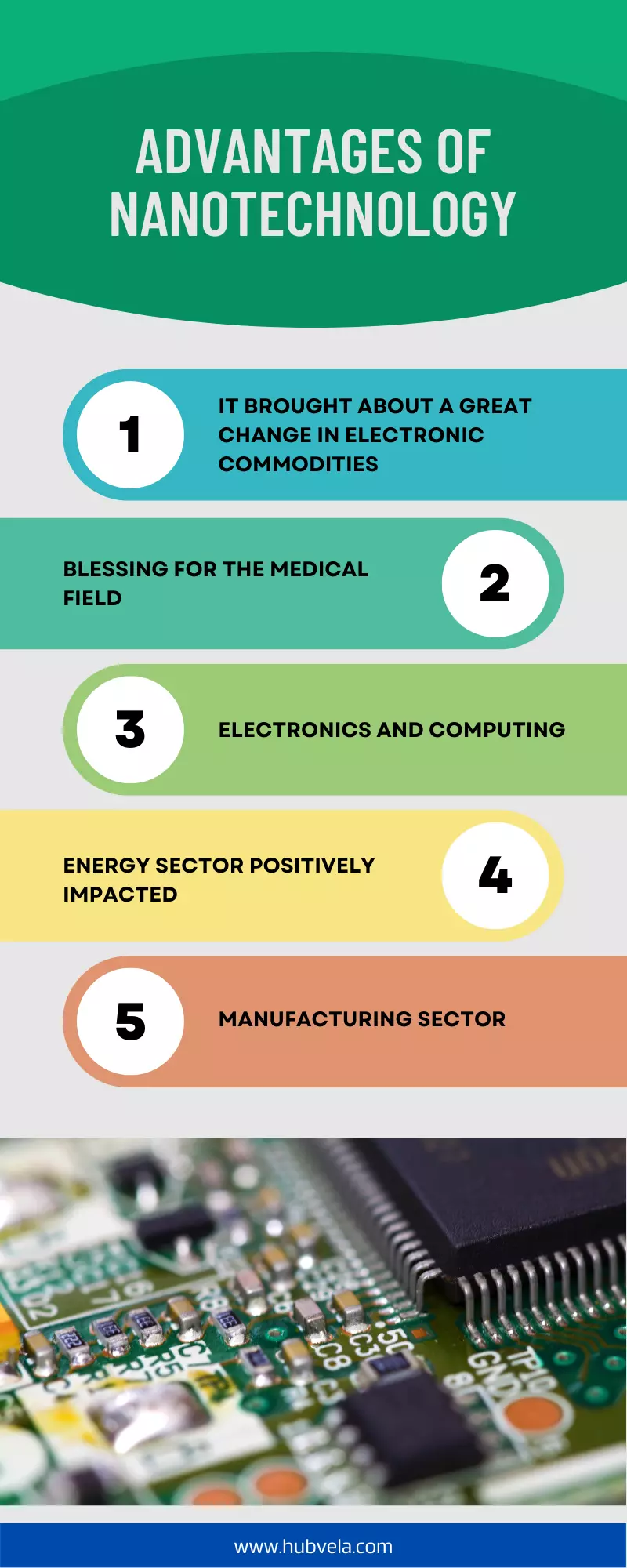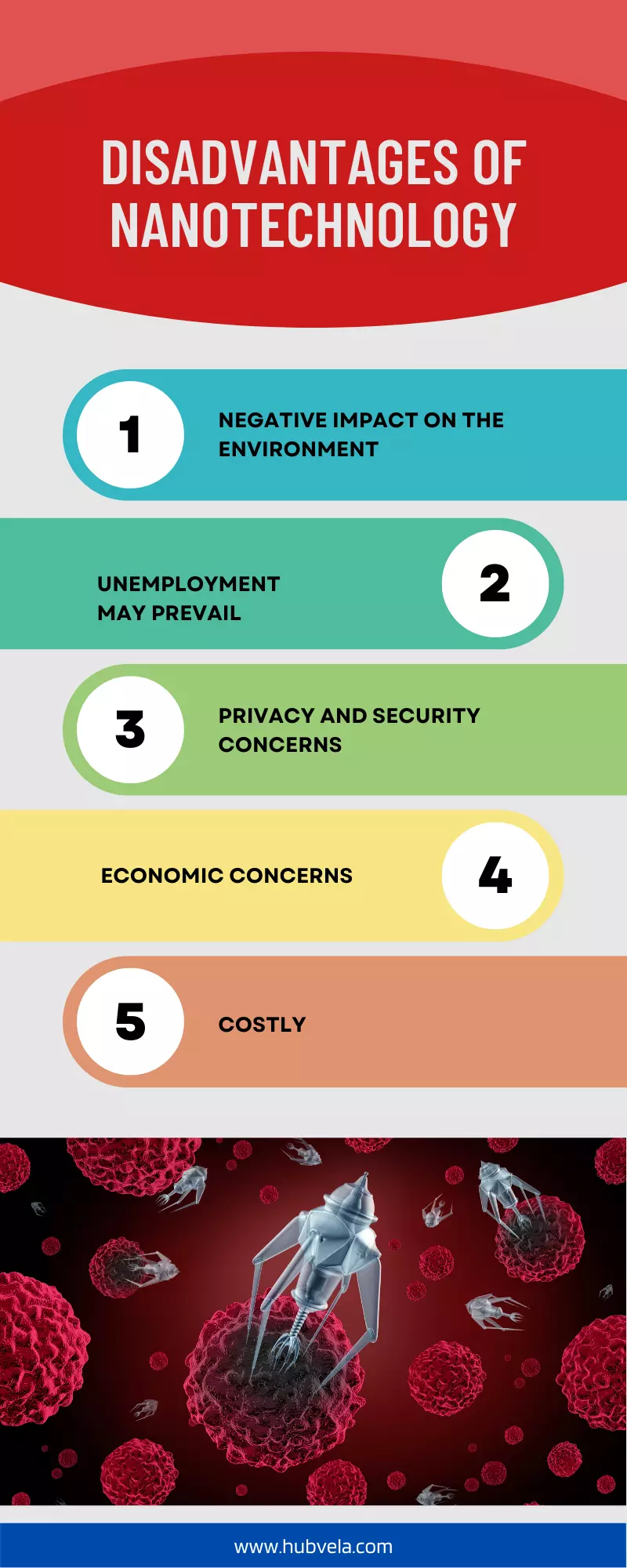Nanotechnology is considered a revolutionary technology that could solve the world’s most important issues.
Nanotechnology is indeed a powerful technology however it comes with its own set of advantages and disadvantages.
In this article we will explore the advantages and disadvantages of nanotechnology, and the implications of nanotechnology both positive and negative in order to understand how it impacts our lives.
We will look at the current applications of nanotechnology and consider their potential effects on our environment, economy and society.

--Advertisement--
Advantages of Nanotechnology
Following are some of the advantages of nanotechnology.

1. It brought about a great change in electronic commodities
Nanotechnology is the most common technology used to manufacture electronic commodities today.
It’s hard to imagine how a chip that is just a few centimeters wide can contain thousands of memories.
It has been designed using a complex circuit design which has completed the chip essentials and made it portable for people to use it, regardless of where they move to, for carrying any electronic items between places.
Even complex calculations can now be performed by a small smartphone instead of a supercomputer.
2. Blessing for the medical field
Medical fieldwork has been improved a lot by nanotechnology. The discovery of disease and discovering ways to treat it has become easier in the modern day.
A wide range of drugs has been produced as a result of the use of nanotechnology in medicine. Through nanotech drugs have been developed to cure diseases such as cancer that were previously incurable.
The medical field benefits greatly from Nanotechnology.
3. Electronics and Computing
Nanotechnology very soon will revolutionize the field of electronics. Nanoparticles such as quantum dots, produce light and could be utilized in reduction of display screens.
It is already possible for silicon chips to contain millions of components but the technology is reaching its limits. At some point, silicon chips will no longer function properly if even a molecule is out of place.
An atomic level of accuracy will be possible with nanotechnology when it comes to constructing circuits.
Many electronic product procedures and applications are capable of being revolutionized by nanotechnology.
Nano transistors, nano diodes, OLEDs, plasma displays, quantum computers, and many other areas of electronics benefits from the continued advancement of nanotechnology.
4. Energy sector
Nanotechnology can impact the energy sector positively. Energy might be obtained and utilized in different ways in the future via nanotechnology.
Nanotechnology has the potential to make solar power economical by lowering cost of solar panels and other equipments related to solar power.
Solar power will be more feasible this way. An increase in the efficiency of energy storage devices can be led by nanotechnology.
There will also be new methods of generating and storing energy which can be developed.
Nanotechnology has the ability to develop smaller products capable of producing, absorbing, and storing much more energy.
Which can result in more effective energy-producing and storing products. Batteries, fuel cells, and solar cells sizes can be reduced by nanotechnology.
5. Manufacturing sector
The use of nanotechnology makes almost any manufactured product faster, lighter, stronger, smarter, safer, and cleaner.
These examples demonstrate some of the possibilities. New materials made possible by nanotechnology are revolutionizing many areas of manufacturing already.
Materials such as nanotubes and nanoparticles could pave the way for new techniques and superior products.
These nanotubes and nanoparticles are tubes and particles that measure just a few atoms across, and aerogels are lightweight, strong materials with exceptional insulation properties.
The construction of novel materials and objects could also be helped by nanobots and nano factories, which are robotic bots that measure a few nanometers in length.
Disadvantages of Nanotechnology
Below are the disadvantages of nanotechnology.

1. Negative Impact on the Environment
A rise in pollution is seen as a result of the development of nanotechnology. For example due to the nanoparticles that produce during the production of various drugs or nuclear weapons etc.
Therefore nanotechnology has a significant impact on the environment in lots of ways.
Humans in such environments are affected by many diseases and also there are diseases that affected the animals who live there as well.
2. Unemployment may prevail
A lot of human labor work has been reduced by innovation in science and technology and people have lost many of their jobs.
Their places have been taken by technology, specifically engineering nanotechnology has increased the scope of machines and reduced the amount of labor-intensive work in chemistry.
3. Privacy and security concerns
With the development of nanotechnology, there is now a possibility that microscopic undetectable recording devices will be created.
Also the possibility of making atomic weapons would be much easier and more accessible.
If the wrong people controll them, there will be a very dangerous situation. If mass destruction is made easier, then cellular destruction can be easily carried out, as mass destruction can be done with much ease.
Also, if self-replicating weapons are made it would be difficult to defend when such weapons are made, especially when measures are not taken into consideration.
4. Economic concerns
Exactly like every other technological advancement the nanotech would have a significant impact on the economy.
In the beginning there may be a cost associated with the production process and the products but this is likely to change as the market adjusts.
It is expected that more companies will have to switch to nanotechnology if there is more demand for nanoproducts.
A change of this much magnitude is going to lead to a lot of businesses closing down as they would no longer be able to stay competitive in the market.
5. Costly
Even nanotechnology is a boon in medicine field, engineering, and material science. In spite of this, the technology is extremely costly.
The same goes for the raw materials that are needed for the production of nanotechnology. They are very expensive as well.
Thus it becomes more and more expensive for an ordinary man to procure technology in the long run.
Conclusion on the Advantages and Disadvantages of Nanotechnology
Nanotechnology is no doubt an emerging field that holds a great potential to revolutionize different industries.
Despite its immense potential it is important to consider the risks associated with this technology and be aware while attempting to use it in various applications.
Nanotechnology will continue to shape our lives but we must ensure that we make well-informed decisions when using it.
It is clear that the advantages of nanotechnology far outweigh the disadvantages if used carefully and appropriately.


